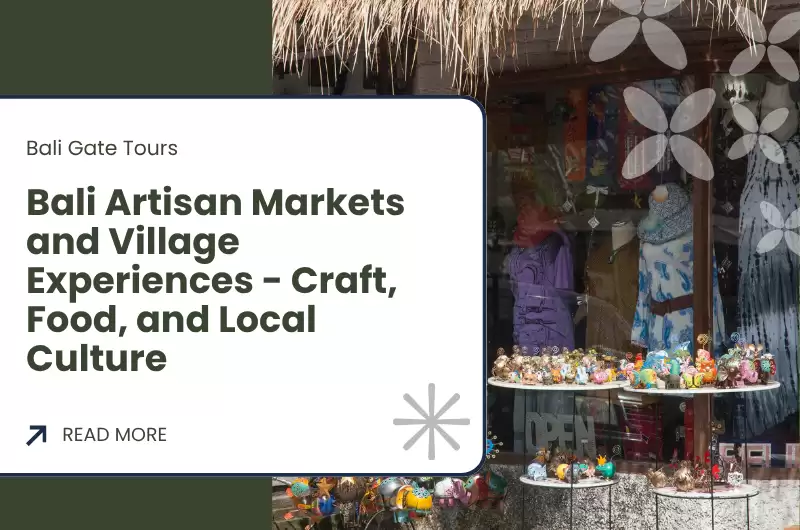Bali Artisan Markets and Village Experiences - Craft, Food, and Local Culture

Bali is a treasure trove of culture, art, and culinary delights, and one of the most immersive ways to experience the island’s vibrant lifestyle is through its artisan markets and village tours. These experiences allow travelers to engage directly with local artisans, sample authentic Balinese cuisine, and gain a deeper understanding of the island’s traditions and heritage. Unlike the bustling tourist centers, these hidden gems offer intimate encounters with the heart of Balinese life.
Visiting Bali artisan markets provides a colorful insight into the island’s craft traditions. From intricately carved wood statues and handwoven textiles to silver jewelry and traditional paintings, each item tells a story passed down through generations. Many markets are set within local villages, where visitors can observe artisans at work, learning about the techniques and cultural significance behind each craft. Watching a master carver transform a simple block of wood into a delicate figure or seeing the meticulous process of hand-dyeing fabric fosters appreciation for Bali’s artisanal heritage.
Culinary experiences are an integral part of exploring Balinese villages. Many tours include stops at local food markets, where travelers can taste fresh tropical fruits, traditional snacks, and local specialties like babi guling (suckling pig) or lawar (a vegetable and meat salad spiced with coconut and herbs). Sampling these dishes in their place of origin allows visitors to appreciate the depth of Balinese culinary culture while supporting local vendors. The vibrant aromas, colorful displays, and lively interactions with market sellers create an engaging sensory experience.
Guided tours through Balinese villages offer the opportunity to witness traditional ceremonies, temple rituals, and community gatherings. These village experiences provide context for the crafts and culinary traditions, demonstrating how cultural practices are woven into daily life. Visitors may witness offerings being prepared for temple festivals or see villagers working together in rice fields, giving a holistic understanding of Balinese culture that extends beyond souvenirs and food.
For those interested in hands-on experiences, many artisan villages offer workshops where visitors can try their hand at craft-making, cooking, or even dance and music. Participating in a batik painting session or learning to prepare a traditional Balinese dish under the guidance of a local instructor allows travelers to immerse themselves in the creative process. These activities create lasting memories and foster a personal connection with the artisans and communities they visit.
Photography enthusiasts find Bali’s artisan markets and villages exceptionally photogenic. The intricate details of hand-crafted items, the vivid colors of traditional fabrics, and the dynamic scenes of local life provide endless opportunities for capturing authentic Balinese culture. Whether documenting the delicate hands of a silver-smith at work or the vibrant energy of a bustling market, visitors can create visual stories that convey both beauty and cultural depth.
Sustainability is another important aspect of visiting Bali village experiences. Supporting local artisans and food vendors helps maintain traditional practices and promotes community well-being. Many tours emphasize ethical engagement, encouraging travelers to purchase responsibly, respect local customs, and minimize environmental impact. This approach ensures that tourism benefits both visitors and the communities they interact with, fostering a sense of shared responsibility for cultural preservation.
Interactive village tours often include guided walks through surrounding rice terraces, spice gardens, and coconut groves. Along these trails, guides explain the ecological and cultural significance of the landscape, highlighting the interconnection between nature, agriculture, and daily life in Bali. Travelers gain insight into sustainable farming practices, traditional irrigation systems known as subak, and the role of agriculture in supporting local communities.
The combination of craft, culinary, and cultural experiences makes artisan market and village tours ideal for travelers seeking an immersive day in Bali. Families, solo travelers, and groups can all enjoy these tours, as they cater to diverse interests and provide both educational and recreational value. Engaging with locals, tasting authentic food, and participating in creative workshops ensure that the experience is memorable and meaningful.
In summary, exploring Bali artisan markets and village experiences offers a rich, multi-dimensional understanding of the island’s cultural heritage. From observing skilled artisans and tasting local cuisine to participating in hands-on workshops and walking through scenic villages, these tours provide travelers with an intimate and engaging glimpse into Bali’s heart and soul. The vibrant crafts, flavors, and traditions encountered along the way highlight the island’s enduring appeal as a destination where culture and community flourish.










